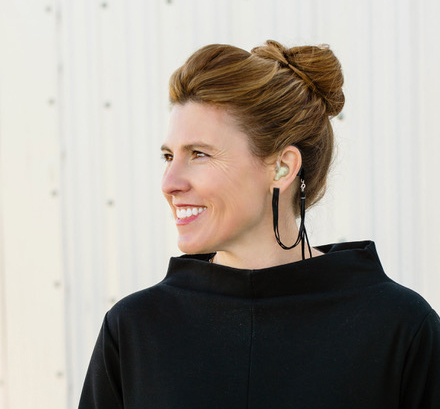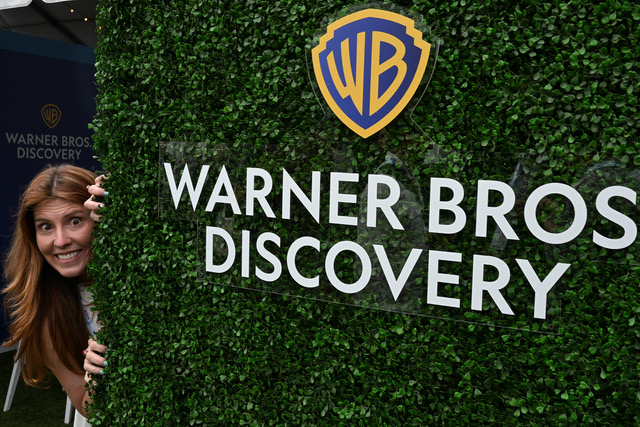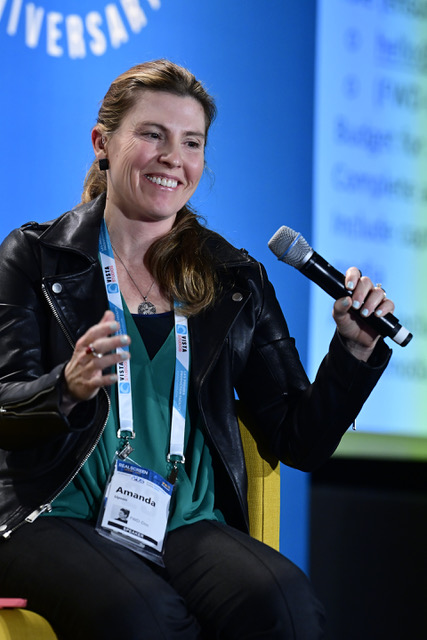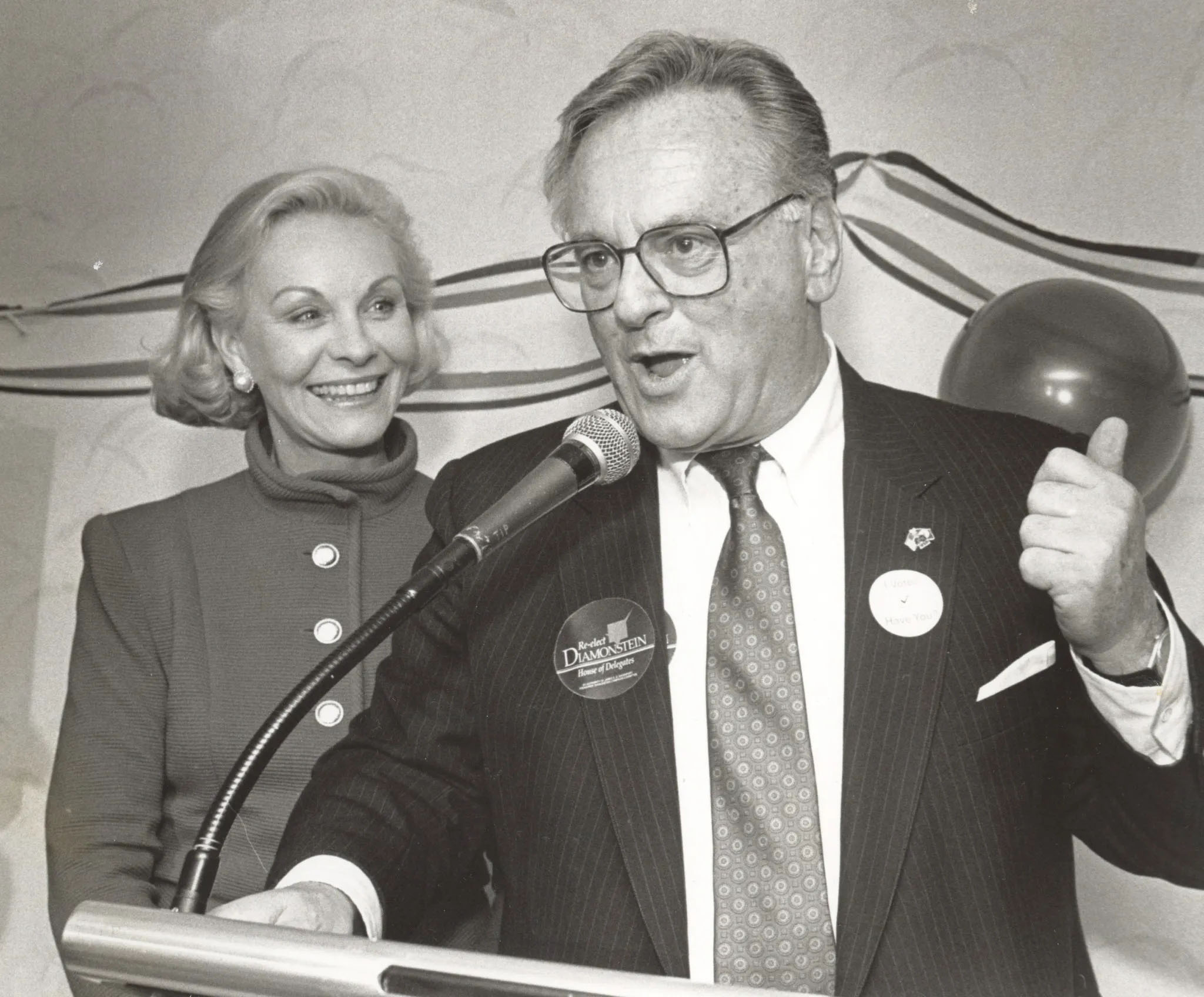Small Acts

Small Acts
Amanda Upson (Col ’95) was in middle school when she met the professional mentor who changed her life—the late Alan Diamonstein (McIntire ’55, Law ’58). In a story best told in her own words (see “Meeting My Mentor,” below), the 11-year-old arrived at Diamonstein’s Newport News, Virginia, office to ask for a recommendation to serve as a page for the Virginia House of Delegates. Upson was accepted into the page program and went on to work for Diamonstein through high school, college, and after she graduated.
“I remember his kindness, decency, commitment to service, and respect for others, which extended to providing me the opportunity to see up close how politics, policy, and law worked,” she said.

Amanda Upson is the founder of Tuck and Roll Productions and was named one of Forbes' “40 Women to Watch Over 40.” Image Credit: Laura Mahony
Labor and employment law became Upson’s first career. In 2015, she left legal practice to become a movie producer. Her producing credits include the thriller “Magnum Opus,” which secured a spot at the 2018 Virginia Film Festival, and the documentary “A Long March,” about three Filipino-American World War II veterans fighting for recognition of their contributions to history. “Magnum Opus” was directed by alumnus Kevin Elliott (Engr ’95).
Upson, who is deaf, serves on the board of FWD-Doc: Filmmakers With Disabilities. She is series producer of RENEGADES, short films showcasing the lives of diverse, lesser-known historical figures with disabilities and their contributions to society. RENEGADES is part of the American Masters documentary series on PBS, and Upson is a consulting producer for American Masters' Visibility, Inclusion and Accessibility Initiative.

Upson left a career in labor and employment law to become a movie producer. Image Credit: Rahoul Ghose
Throughout her working life, Upson has made time to provide career guidance to University students and alumni through the UVA Career Center and its Virginia Alumni Mentoring program. “Amanda has gone above and beyond to make time for UVA students who have interests in law, film, and beyond,” said Kate Melton, senior associate director of external engagement for the Career Center. “She personalizes her interactions with students and has extended freelance project work and internships to students that she specifically engineered for their interests and skill development. We are so grateful to have Amanda in our VAM community.”
Upson has fond memories of her time as an undergraduate. She loved live music—the Alpha Omicron Pi Battle of the Bands and the nascent Dave Matthews Band’s performances at Trax—and winning Wallyball and field hockey intramural championships.
“No one appreciates earning a Wallyball championship t-shirt more than me,” she laughs. “But the highlight was the people—so many interesting people. From the faculty to the friends, to Hazel serving vegetable kugel in Open Square.”
Open Square was the dining space for Monroe Hill (now Brown College at Monroe Hill), the self-governed community on Grounds where Upson lived as an undergraduate. “I have many fond memories of dinner conversations in Open Square and many friendships that have survived all these years,” she said. “I am most grateful I got to spend a majority of dinners in a big group conversation with Bernard Mayes.” Mayes was a media studies professor from 1984 to 1999, and a Monroe Hill faculty fellow.
— Amanda Upson
“I’ve always appreciated how one person’s small acts can have ripples far beyond their small sphere of influence,” Upson said, “and Bernard Mayes was a masterclass in the impact one person can have. I’ve spent a great deal of the last four years working within the PBS and the public media ecosystems and it is a satisfying full-circle experience to go from hearing from Bernard Mayes about his contributions to the early days of building the public media system and having the chance to work within it.”

Upson on a panel at the Realscreen Summit, an annual non-fiction film and television industry event. Image Credit: Rahoul Ghose
Upson has been connecting with UVA students through the Career Center since shortly after graduating. She makes a point to help students and alumni whose backgrounds may make navigating career decisions more challenging.
“There are students coming from situations where they don’t have family support, or understanding about why they’d leave a good paying job that is unfulfilling,” she explained, “and that’s not an easy conversation to have with a co-worker or supervisor. I’m happy if I can help people get clarity about what they think is best for them in a way that is free from pressure or judgment. There’s a mentee from the graduating class of 2014 or 2015 whose hometown is near mine,” she continued. “Like me, he doesn’t have the benefit of family with experience in corporate work environments. I’ve gotten to talk to him multiple times over different stages of his career. I’m honored he still reaches out to me when he’s thinking about what direction to take or weighing job offers or thinking about changing careers. I’ve loved getting to know him and to learn about his work.”
Upson will have a chance to wear her Wallyball championship t-shirt back to Grounds this fall, when she returns for move-in day with her daughter. “I have been overly enthusiastic in encouraging her to take classes from some professors I really enjoyed who are still there,” she said. “I’m beyond thrilled she is going to UVA.”

Alan Diamonstein and his wife, Beverly, celebrate his reelection to the House of Delegates in November, 1989. Image Credit: Newport News Daily Press
Meeting My Mentor
I appeared unannounced at Alan Diamonstein’s (McIntire ’55, Law ’58) Newport News law office, assuring the receptionist I’d wait quietly until he was available to meet with me. One of my superpowers is sitting and waiting and I always carried a couple of books, so I wasn’t dissuaded when the receptionist told me he wouldn’t be available for several hours and, even if I waited, he might not have time to talk to me. When he called me into his office, I sat facing him behind his fancy desk and told him I needed a recommendation for my application as a page at the Virginia House of Delegates.
He told me he would need information about me to determine if he could provide a recommendation. I liked him. He was nice, and he talked to me in a way that conveyed he understood the solemnity of my ask. It was clear he was going to make me work for it, and I loved nothing more than proving myself. I went back to his office three or so times, each time delivering what he requested: a resume (I was a kid of a single mother who was a hairdresser and I had no idea what a resume was, but I went to the Grissom Library and figured that out), a writing sample, and a report card. It’s possible he thought assigning tasks would chase me away, but I think it’s more likely he was assessing my potential page skills, as that job required the page to respond to a lighted board to receive and execute any assignment with enthusiasm—sometimes it was to pull legislative history and sometimes it was to bring a legislator one of Chicken’s famous limeades.
I ended up working with him when I was a page and as a legislative researcher at the Virginia General Assembly—I was the only high school kid in the office. I also worked with him during his campaigns and in his law office until I started full-time employment in Washington, D.C., after college. During those years, I had the good fortune to accompany him as an administrator and driver to meetings related to his work as a Virginia Delegate and with the Democratic Party. I don’t know that he ever needed my help, but I desperately needed the paycheck and the exposure. Both the paycheck and exposure—along with my UVA experience—were life-changing, and I’m pretty sure his recommendation is what sealed my fate at UVA.
I’m eternally grateful for all the opportunities he gave me to be in the room and exposed to the process. I’m especially grateful he gave me the opportunities to develop the soft skills which would become the most important to me at UVA and in my career. From him, I learned a great deal about service, connecting people, building relationships, constructing an agreement that would serve all parties, getting buy-in to drive an initiative forward, and modeling becoming the tide that can raise all ships. Alan Diamonstein was a legendary public servant, and I am so lucky to have gotten to learn from him.

